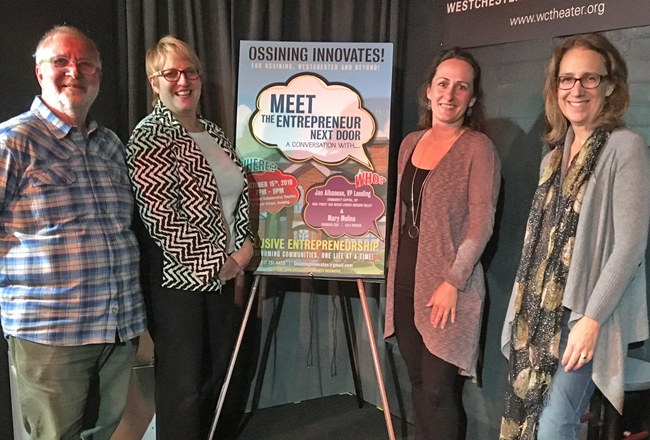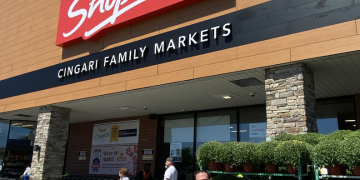Henry Welt and Abigail Lewis had recently become neighbors in Ossining when Welt came up with the idea that eventually evolved into their co-founding of Ossining Innovates!, a community-centered entrepreneurship initiative.
Welt, a lawyer and the founder of WeltAdvisors as well as an adjunct professor at the Fashion Institute of Technology, and Lewis, also a lawyer with decades of corporate leadership experience at IBM, saw a need for this kind of high-quality business offerings in Westchester.

This kind of education is typically only offered in Ivy League schools, or large urban accelerators in startup hotspots around the country ”” a huge drawback, they thought, for both aspiring business owners in our region and for the landscape of entrepreneurial thinking around the country.
“A world which is changing as rapidly as our world changes, being armed with these tools that prepare an entrepreneur … to create something that is both sustainable and is reactive becomes critical not only to the success of the business when you launch it, but to a business survival,” Lewis said.
“Those kinds of skills are not typically taught in the kinds of small-business programming that is often available in communities like Westchester, where people are very focused on what we consider to be the ”˜nuts and bolts”™ of a business, like basic accounting and the basic structure of how you set up your business.”
According to Welt and Lewis, the many accelerators teaching entrepreneurial business processes nationwide have their flaws. Financial and logistic barriers make them inaccessible to those with few resources.
“Part of the inspiration for what Abby and I are doing is that we realized that all of this new teaching was effectively unavailable to people from under-resourced communities,” Welt said.
“So you had a cycle once again in American business of those people who have access to resources and who are well-resourced themselves getting the best training in the world, whether it”™s at Stanford, Harvard, MIT, Columbia or wherever, or whether it”™s by neighborhood, in Silicon Valley or Brooklyn Navy Yard or Boulder, Colorado, or Austin, Texas, or all these clusters developing in the United States. All the training that they were doing ”” not necessarily because anyone made it to be discriminatory ”” but all the training was really going to people who were very well-resourced.”
In response, they made their accelerator to fill in the gaps of what has been missing in the entrepreneurial ecosystem, making a high-quality program available to people of different backgrounds and life experiences.
“We developed a program that we think is, in terms of its academic delivery, is as high-quality as any program in the United States,” Welt said, adding that their syllabus is adapted in part from Ivy League-level entrepreneurial courses.
All of its accompanying materials and mentorship services are totally free and programming is conducted around working hours, unlike many other entrepreneurship programs, so that participants may keep working throughout the program.
Most importantly, the pair, who teach many of the classes along with guest teachers and entrepreneurs, emphasize a culture of inclusivity, as much for an individual”™s benefit as for the group. They believe that everyone can bring in the value of their life experiences to share.
“Entrepreneurship is a team sport,” Welt said. “It”™s a group enterprise, not a solo enterprise. And if you keep people in communities that are continuously under-resourced, then you don”™t get the kind of teams that you get when you diversify.”
The other essential aspect of the accelerator is that it is focused on businesses that are local and not necessarily scalable. This makes it unique from most other incubators, which essentially require scalability for entry. For Ossining Innovates!, the goal is to help businesses become successful without being tied exclusively to cash flow or demanding that they size up.
The organization is not yet registered as a 501(c)(3), but they are funded through donations, along with some grants. They have also partnered with the Women”™s Economic Development Center for the accelerator project, which provides assistance, along with some help in outreach and coordination, but the project is still primarily run by Lewis and Welt.
As interviews are underway for the third cohort of entrepreneurs, Lewis and Welt shared some success stories from their first cohort, which has recently wrapped up its one-year process (consisting of 20 weeks of pedagogical training and another seven or eight months of follow-up training). It has been conducted virtually since its start at the beginning of the pandemic, an aspect that will likely remain so that it can be accessible to as many people as possible.
One notable story from the first cohort was of a participant who came in with the goal to start a nonprofit concerned with water purity in Hudson Valley streams and rivers.
“He told us about three months after his time in the pedagogical session that he was able to raise $100,000 in ”¦ grants to get that business off the ground, and now he”™s off and running,” Lewis said.
They also recalled a partnership within the program between a retired IBM engineer and a formerly incarcerated person, collaborating on an idea for a nonprofit to serve other formerly incarcerated individuals as they re-enter the community, emphasizing the benefits of utilizing the experiences of both individuals.
“We very much believe that both sets of those kinds of benefits are equally valuable,” Welt said. “We don”™t think one group is giving to the other group, we don”™t think anyone”™s giving back to society or whatever the current expression is when they participate collaboratively with other people. We think each group benefits from the experience of being in a room with that other person and from learning something from what that other person has learned in their individual life experiences.”
Another participant, Kendra Porter, used her background working in the fashion industry to create Honor Your Style, a personal image consulting agency, and launched a project called ShopWestchester during the pandemic to encourage buyers to support local businesses.
Carly Jacobs, a full-time film producer and a mother from Sleepy Hollow, utilized the accelerator to launch her business Into Leaf, which brings adult education programming to participants in Sleepy Hollow and the surrounding towns through partnerships with skilled artisans and artists, such as photographers and coffee roasters.
“She wanted to be attentive to the needs of mothers or people who otherwise care for young kids, to have a place to go where they would not only have something for the kids to do, but also something that would be of interest to the parents,” Lewis said. “It”™s now running and she”™s run about five or six programs now, launched about six or eight weeks ago.”
The model is based on growing businesses that will stay local, grow locally and contribute to the local economy.
“By the nature of what we”™re doing and because we”™re not focused only on scalable businesses, the vast majority of the businesses that will come in to us and that will leave our accelerator program are highly likely to remain local,” Welt said. “So we are an engine for local economic growth.”


















